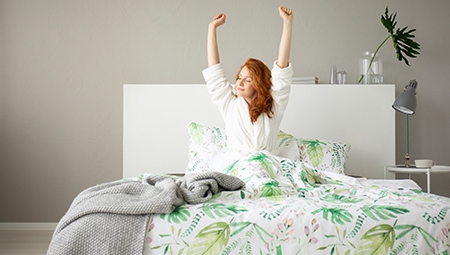
For years, occupational therapists have used weighted blankets to help kids with autism and other disorders sleep better. But recently they have surged in popularity, even among people without diagnosed sleep issues. Why? Partly because sleeping under a weighted blanket is ultra-cozy—as if you’re enjoying a sustained hug—and partly because there’s some good science1 behind the idea that weighted blankets can improve sleep for those with chronic insomnia.
Here’s a look at whether a weighted blanket might be a good fit for you or your loved ones.
What are weighted blankets?
Weighted blankets are simply blankets with some extra heft—anywhere from 3 to 30 pounds, and preferably about 10 percent of the user’s body weight.2 The weight usually comes from tiny glass beads or polyethylene pellets sewn inside layers of fabric, although some companies use a metal-chain construction over the top of the blanket, which might have extra tactile benefits.
A weighted blanket feels sort of like the lead apron you may have encountered at a doctor’s or dentist’s office to protect your organs and tissues from an X-ray. These blankets are usually designed just for one person—they’re generally not big enough to spread over a queen- or king-sized bed. Look for one that’s washable or has a washable coverer, since it’s sure to get dirty over time.
Who can benefit from Weighted Blankets?
Most research about weighted blankets has been done on children or adults with autism,3 ADHD, anxiety,4 PTSD, or insomnia and other sleep disorders—and, in general, the blankets seem to reduce many of the barriers to good sleep. Even when sleep didn’t improve, as with one study examining autistic children,5 most of the participants still preferred the weighted blankets.
Scientists aren’t sure why weighted blankets help improve sleep, but one theory is that the pressure from the blanket encourages production of the feel-good chemical serotonin, which in turn converts to sleep-promoting melatonin. The pressure may also stimulate oxytocin, which can diminish stress. The blankets also deliver a cocooning feeling, which can calm anxiety, and their weight may discourage you from tossing and turning in bed. You don’t have to have sleep problems to benefit from a weighted blanket, though—anyone can enjoy the heavy, snuggly feeling it brings.
What are the cons of weighted blankets?
Weighted blankets provide a lot of extra warmth, so if you’re concerned about being too hot, opt either for a blanket made of cotton or one labeled “all-season,” both of which are more breathable.
One caveat: All-season blankets usually consist of a blend of higher-end materials, such as bamboo, so you can expect to pay even more for an already expensive product (a good-quality weighted blanket runs from roughly $70 to $3006). Allergy sufferers can find hypoallergenic options, which also come at a bit higher price.
In general, there’s minimal danger in trying a weighted blanket, but you should avoid using them on infants, toddlers or preschoolers, or anyone else with mobility issues, who might not be able to remove the blanket if it covered their face. Also, in rare instances, the beads or pellets could fall out and become a choking hazard for small children.
For the rest of us, weighted blankets can be an investment toward deeper, cozier and more restful naps or nights of sleep.
For more sleep content, continue reading our blog, where we answer questions like: Does intermittent fasting help with sleep? And how many hours of sleep is ideal?
Sources:
- “Positive Effects of a Weighted Blanket on Insomnia,” Journal of Sleep Medicine & Disorders, May 2015.
- “Exploring the Safety and Therapeutic Effects of Deep Pressure Stimulation Using a Weighted Blanket,” Occupational Therapy in Mental Health, December 2006.
- “The Impact of Weighted Blankets on the Sleep and Sensory Experiences of Autistic Adults,” The American Journal of Occupational Therapy, August 2020.
- “Weighted Blanket Use: A Systematic Review,” The American Journal of Occupational Therapy, April 2020.
- Weighted Blankets and Sleep in Autistic Children—A Randomized Controlled Trial, Pediatrics, August 2014.
- “Weighted blankets might ease insomnia and anxiety. Here’s what to know before buying one,” by Laura Daily, The Washington Post, January 2019.




